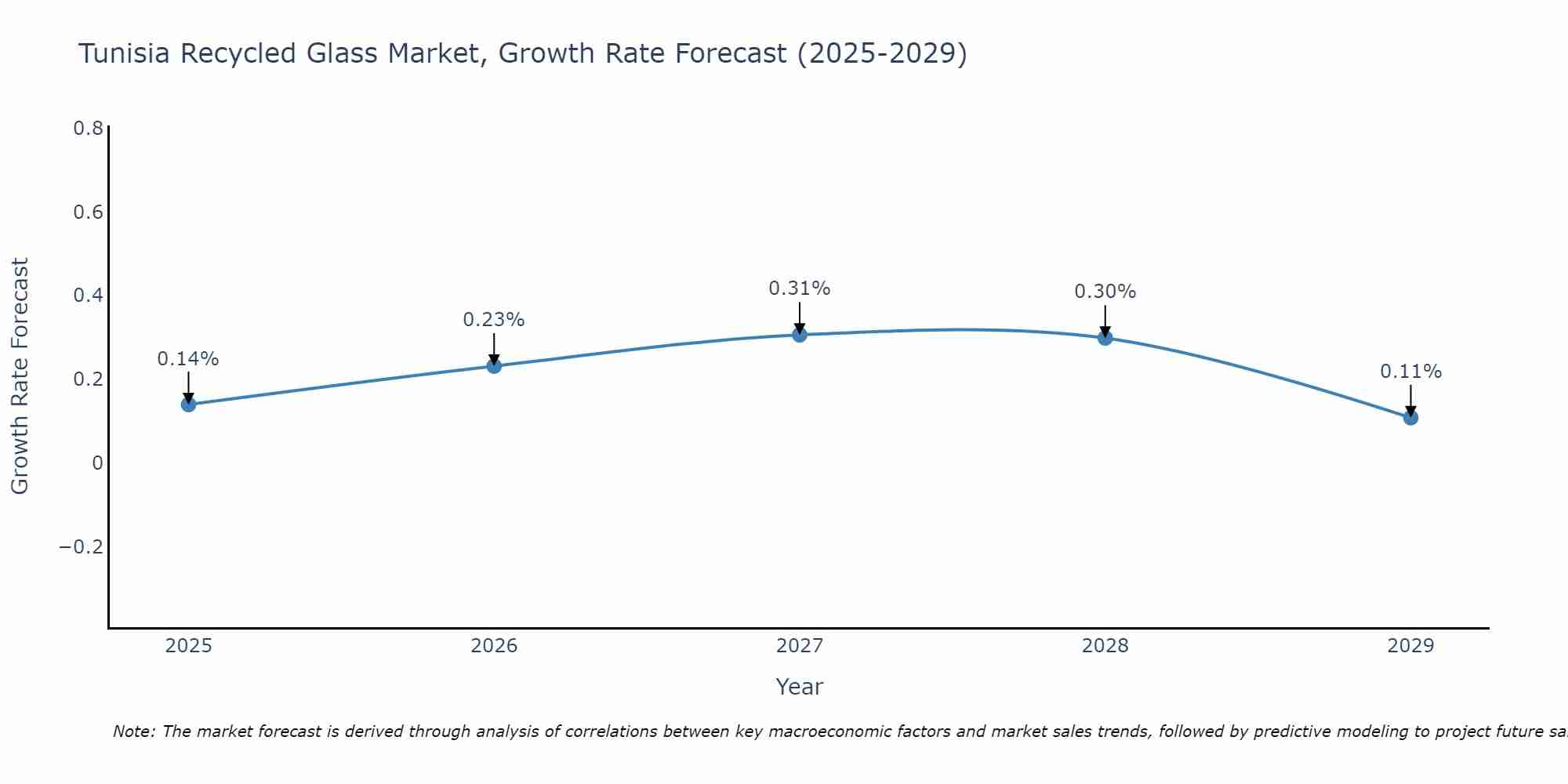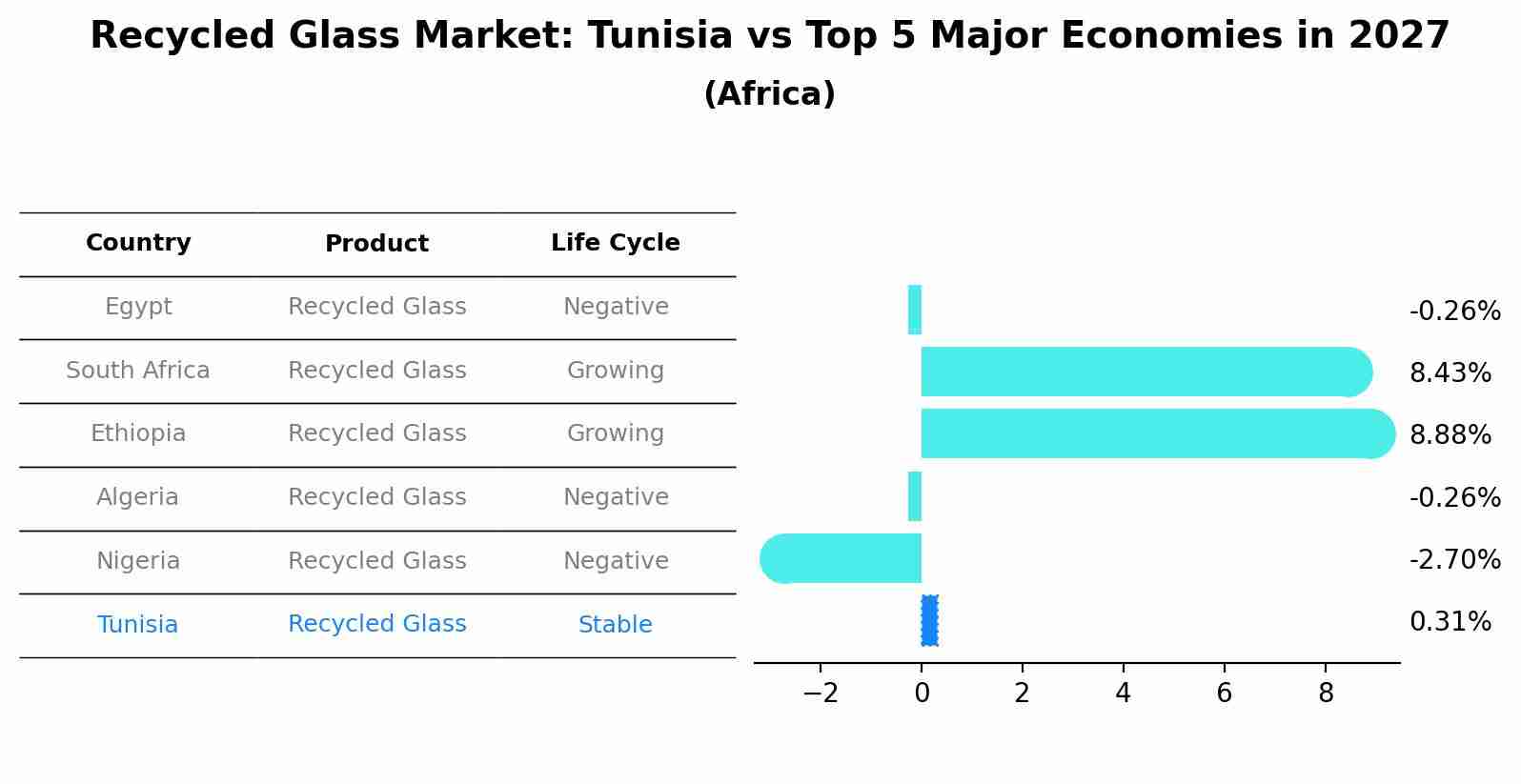Tunisia Recycled Glass Market (2025-2031) Outlook | Analysis, Growth, Industry, Forecast, Share, Size, Value, Companies, Trends & Revenue
| Product Code: ETC355734 | Publication Date: Aug 2022 | Updated Date: Aug 2025 | Product Type: Market Research Report | |
| Publisher: 6Wresearch | Author: Ravi Bhandari | No. of Pages: 75 | No. of Figures: 35 | No. of Tables: 20 |
Tunisia Recycled Glass Market Size Growth Rate
The Tunisia Recycled Glass Market is projected to witness mixed growth rate patterns during 2025 to 2029. Starting at 0.14% in 2025, the market peaks at 0.31% in 2027, and settles at 0.11% by 2029.

Recycled Glass Market: Tunisia vs Top 5 Major Economies in 2027 (Africa)
In the Africa region, the Recycled Glass market in Tunisia is projected to expand at a stable growth rate of 0.31% by 2027. The largest economy is Egypt, followed by South Africa, Ethiopia, Algeria and Nigeria.

Tunisia Recycled Glass Market Synopsis
The Tunisia Recycled Glass Market is witnessing steady growth driven by increasing environmental awareness and sustainability initiatives. The demand for recycled glass products is rising as consumers and businesses prioritize eco-friendly materials. The government`s support for recycling programs and waste management regulations further contribute to market growth. Key players in the market are focusing on developing innovative recycling technologies and expanding their product offerings to meet the growing demand. The construction and packaging industries are the primary sectors driving the demand for recycled glass in Tunisia. Overall, the market offers significant opportunities for growth and development as the country continues to emphasize sustainable practices and reduce its environmental footprint.
Tunisia Recycled Glass Market Trends
The Tunisia recycled glass market is experiencing a growing trend towards sustainability and eco-friendliness, with consumers and businesses increasingly seeking out products made from recycled glass. This shift is driven by a growing awareness of environmental issues and a desire to reduce waste and carbon footprint. The market is also seeing a rise in demand for recycled glass packaging in industries such as food and beverage, cosmetics, and pharmaceuticals due to its eco-friendly image and recyclability. Manufacturers are responding to these trends by investing in technology and processes to increase the quality and availability of recycled glass products, as well as promoting the benefits of using recycled glass in various applications. Overall, the Tunisia recycled glass market is poised for further growth as sustainability continues to be a key focus for both consumers and businesses.
Tunisia Recycled Glass Market Challenges
In the Tunisia recycled glass market, one of the main challenges is the lack of awareness and understanding among consumers about the benefits of using recycled glass products. This leads to lower demand for recycled glass items compared to traditional glass products. Additionally, there is a need for more investment in recycling infrastructure and technologies to improve the collection, sorting, and processing of glass waste. The market also faces competition from cheaper imported glass products, making it difficult for local recycled glass businesses to compete. Overall, addressing these challenges will require targeted marketing campaigns to educate consumers, increased government support for recycling initiatives, and investments in modernizing recycling facilities to enhance the efficiency and quality of recycled glass products in Tunisia.
Tunisia Recycled Glass Market Investment Opportunities
The Tunisia Recycled Glass Market presents promising investment opportunities due to increasing environmental awareness and government initiatives promoting sustainability. With a growing demand for eco-friendly products, there is a rising need for recycled glass in various industries such as packaging, construction, and art. Investing in recycling facilities or glass processing plants in Tunisia can capitalize on this trend and contribute to a circular economy. Additionally, exporting recycled glass to international markets can further expand the investment potential. Collaborating with local municipalities and businesses to establish efficient collection and recycling systems can also enhance the market presence and profitability of investments in the Tunisia Recycled Glass Market.
Jordan Agar Market Government Policies
The Tunisian government has implemented several policies to promote the growth of the recycled glass market. This includes providing financial incentives and subsidies to businesses engaged in glass recycling, as well as investing in infrastructure for collection and processing of recycled glass. Additionally, the government has set recycling targets and regulations to encourage compliance and ensure the sustainability of the industry. Furthermore, there are initiatives in place to raise awareness among consumers about the benefits of using recycled glass products, aiming to increase demand in the market. Overall, the government`s policies demonstrate a commitment to supporting and further developing the recycled glass industry in Tunisia.
Tunisia Recycled Glass Market Future Outlook
The future outlook for the Tunisia recycled glass market appears promising, driven by increasing awareness of environmental sustainability and the government`s initiatives to promote recycling practices. With growing concerns about plastic pollution, there is a shift towards using more eco-friendly materials like recycled glass in various industries such as packaging, construction, and consumer goods. Additionally, the demand for recycled glass products is expected to rise as consumers become more conscious of the environmental impact of their choices. This trend is likely to create opportunities for companies operating in the recycled glass market in Tunisia, leading to potential growth and innovation in the sector. However, challenges such as collection infrastructure and processing capabilities will need to be addressed to fully capitalize on the market`s potential.
Key Highlights of the Report:
- Tunisia Recycled Glass Market Outlook
- Market Size of Tunisia Recycled Glass Market, 2024
- Forecast of Tunisia Recycled Glass Market, 2031
- Historical Data and Forecast of Tunisia Recycled Glass Revenues & Volume for the Period 2021 - 2031
- Tunisia Recycled Glass Market Trend Evolution
- Tunisia Recycled Glass Market Drivers and Challenges
- Tunisia Recycled Glass Price Trends
- Tunisia Recycled Glass Porter's Five Forces
- Tunisia Recycled Glass Industry Life Cycle
- Historical Data and Forecast of Tunisia Recycled Glass Market Revenues & Volume By Product for the Period 2021 - 2031
- Historical Data and Forecast of Tunisia Recycled Glass Market Revenues & Volume By Crushed Glass for the Period 2021 - 2031
- Historical Data and Forecast of Tunisia Recycled Glass Market Revenues & Volume By Cullets for the Period 2021 - 2031
- Historical Data and Forecast of Tunisia Recycled Glass Market Revenues & Volume By Glass Powder for the Period 2021 - 2031
- Historical Data and Forecast of Tunisia Recycled Glass Market Revenues & Volume By Application for the Period 2021 - 2031
- Historical Data and Forecast of Tunisia Recycled Glass Market Revenues & Volume By Glass Bottle & Containers for the Period 2021 - 2031
- Historical Data and Forecast of Tunisia Recycled Glass Market Revenues & Volume By Flat Glass for the Period 2021 - 2031
- Historical Data and Forecast of Tunisia Recycled Glass Market Revenues & Volume By Fiber Glass for the Period 2021 - 2031
- Historical Data and Forecast of Tunisia Recycled Glass Market Revenues & Volume By Highway Beads for the Period 2021 - 2031
- Historical Data and Forecast of Tunisia Recycled Glass Market Revenues & Volume By Abrasives for the Period 2021 - 2031
- Historical Data and Forecast of Tunisia Recycled Glass Market Revenues & Volume By Fillers for the Period 2021 - 2031
- Historical Data and Forecast of Tunisia Recycled Glass Market Revenues & Volume By Others for the Period 2021 - 2031
- Tunisia Recycled Glass Import Export Trade Statistics
- Market Opportunity Assessment By Product
- Market Opportunity Assessment By Application
- Tunisia Recycled Glass Top Companies Market Share
- Tunisia Recycled Glass Competitive Benchmarking By Technical and Operational Parameters
- Tunisia Recycled Glass Company Profiles
- Tunisia Recycled Glass Key Strategic Recommendations
Frequently Asked Questions About the Market Study (FAQs):
- Single User License$ 1,995
- Department License$ 2,400
- Site License$ 3,120
- Global License$ 3,795
Search
Thought Leadership and Analyst Meet
Our Clients
Related Reports
- Canada Oil and Gas Market (2026-2032) | Share, Segmentation, Value, Industry, Trends, Forecast, Analysis, Size & Revenue, Growth, Competitive Landscape, Outlook, Companies
- Germany Breakfast Food Market (2026-2032) | Industry, Share, Growth, Size, Companies, Value, Analysis, Revenue, Trends, Forecast & Outlook
- Australia Briquette Market (2025-2031) | Growth, Size, Revenue, Forecast, Analysis, Trends, Value, Share, Industry & Companies
- Vietnam System Integrator Market (2025-2031) | Size, Companies, Analysis, Industry, Value, Forecast, Growth, Trends, Revenue & Share
- ASEAN and Thailand Brain Health Supplements Market (2025-2031) | Strategy, Consumer Insights, Analysis, Investment Trends, Opportunities, Growth, Size, Share, Industry, Revenue, Segments, Value, Segmentation, Supply, Forecast, Restraints, Outlook, Competition, Drivers, Trends, Demand, Pricing Analysis, Competitive, Strategic Insights, Companies, Challenges
- ASEAN Bearings Market (2025-2031) | Strategy, Consumer Insights, Analysis, Investment Trends, Opportunities, Growth, Size, Share, Industry, Revenue, Segments, Value, Segmentation, Supply, Forecast, Restraints, Outlook, Competition, Drivers, Trends, Demand, Pricing Analysis, Competitive, Strategic Insights, Companies, Challenges
- Europe Flooring Market (2025-2031) | Outlook, Share, Industry, Trends, Forecast, Companies, Revenue, Size, Analysis, Growth & Value
- Saudi Arabia Manlift Market (2025-2031) | Outlook, Size, Growth, Trends, Companies, Industry, Revenue, Value, Share, Forecast & Analysis
- Uganda Excavator, Crane, and Wheel Loaders Market (2025-2031) | Strategy, Consumer Insights, Analysis, Investment Trends, Opportunities, Growth, Size, Share, Industry, Revenue, Segments, Value, Segmentation, Supply, Forecast, Restraints, Outlook, Competition, Drivers, Trends, Demand, Pricing Analysis, Competitive, Strategic Insights, Companies, Challenges
- Rwanda Excavator, Crane, and Wheel Loaders Market (2025-2031) | Strategy, Consumer Insights, Analysis, Investment Trends, Opportunities, Growth, Size, Share, Industry, Revenue, Segments, Value, Segmentation, Supply, Forecast, Restraints, Outlook, Competition, Drivers, Trends, Demand, Pricing Analysis, Competitive, Strategic Insights, Companies, Challenges
Industry Events and Analyst Meet
Whitepaper
- Middle East & Africa Commercial Security Market Click here to view more.
- Middle East & Africa Fire Safety Systems & Equipment Market Click here to view more.
- GCC Drone Market Click here to view more.
- Middle East Lighting Fixture Market Click here to view more.
- GCC Physical & Perimeter Security Market Click here to view more.
6WResearch In News
- Doha a strategic location for EV manufacturing hub: IPA Qatar
- Demand for luxury TVs surging in the GCC, says Samsung
- Empowering Growth: The Thriving Journey of Bangladesh’s Cable Industry
- Demand for luxury TVs surging in the GCC, says Samsung
- Video call with a traditional healer? Once unthinkable, it’s now common in South Africa
- Intelligent Buildings To Smooth GCC’s Path To Net Zero


















